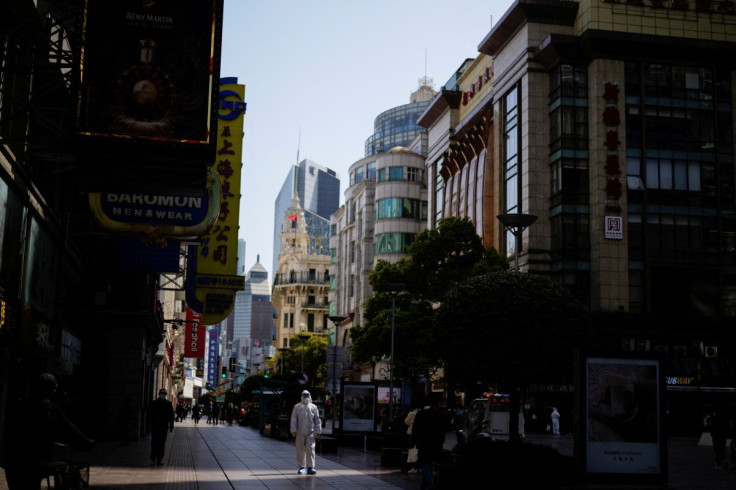COVID-hit Shanghai Heads For Lockdown Exit But China Still Lost In Economic Gloom

Pandemic-hit Shanghai, China's financial hub, unveiled more post-lockdown plans on Thursday as it moves towards a return to normalcy, but a nationwide economic recovery is still a distance away, heightening a sense of urgency for more support.
China's biggest city by economic output has suffered from the lockdown imposed in early April. Other cities not under lockdown but still hemmed in by COVID curbs, including Beijing, have also struggled, with the highly transmissible Omicron provoking stronger responses from health authorities this year.
With the government refusing to loosen its zero tolerance stance on COVID, factories and businesses have been bruised by disruptions caused by lockdowns, endless mass testing and mobility restrictions on vast swathes of the population.
Shanghai is set to finally emerge from its lockdown on June 1 after new infections fell sharply. The mega-city of 25 million people has been cautiously allowing more of its population to venture out and putting more vehicles back onto its once busy streets and boulevards.
City officials said on Thursday that students in junior and senior high school could return to offline classes from June 6, following word earlier in the week that shopping malls and department stores would be allowed to reopen, although in batches, from June 1.
ECONOMIC WOES
As the focus turns to recovery, Premier Li Keqiang on Wednesday offered a grim view of the world's second-biggest economy, saying the difficulties it faces in some aspects were even greater than in 2020, when China was first hit by the COVID-19 outbreak.
Many private-sector economists expect gross domestic product to contract in April-June from a year earlier versus the first quarter's 4.8% growth.
China will strive to achieve "reasonable" GDP growth in the second quarter, Li told thousands of government officials across the country in an online conference.
"The unusual meeting caps an increasingly urgent series of official pronouncements in recent days attempting to resolve the economic disruption caused by the wave of COVID-19 lockdowns," research group Gavekal Dragonomics wrote in a note on Thursday.
"The urgent high-level focus on stabilising growth opens the door for more aggressive stimulus measures to be deployed in coming weeks."
Underlining the tension between economic and COVID policies and the sensitivity surrounding their discussion, social media sharing of state television reports on Li's teleconference was intermittently blocked on China's heavily policed internet.
Some online groups on China's popular WeChat mobile app also forbade the sharing of unverified transcripts - audio or written - from the conference as well as discussion about the event, fearing suspension of their accounts.
BUSINESS CONFIDENCE
"Macroeconomic confidence in China has now deteriorated to the point where what is required is not a loosening around the edges of these broad policy priorities, but wholesale policy U-turns," said JPMorgan in a commentary.
The central bank said on Thursday it would promote more credit for smaller firms and urged financial institutions to prioritise lending to central and western regions, as well as areas and sectors hammered by COVID outbreaks.
The finance ministry also said on Thursday it would offer subsidies to Chinese airlines from May 21 to July 20 to help them weather the coronavirus-induced downturn and higher oil prices.
Domestic air traffic has plummeted because of lockdowns in Shanghai and surrounding cities. Shanghai-based China Eastern said passenger numbers sank 90.7% in April from a year earlier.
Overall air passenger traffic last month plunged nearly 85% year-on-year, and stood at barely 15% of its pre-COVID level in 2019, China's aviation regulator said on Thursday.
Offering a glimmer of hope, the China Passenger Car Association said on Thursday that national vehicle sales rose 34% in the first three weeks of May compared with the corresponding period in April.
But, with measures to control COVID outbreaks depressing incomes, the sales volume was still 16% lower than 12 months earlier, the industry association cautioned.
Road freight transportation and express delivery from distribution centres last week were both stronger than a month earlier but still down sharply on the year, Nomura Global Economics said.
"As long as China does not relax its COVID policy, any other policy measures are of little value right now," said an automotive fastener factory owner surnamed Zheng in the eastern province of Zhejiang.
"Everybody has little confidence or enthusiasm to invest now."
© Copyright Thomson Reuters 2024. All rights reserved.







